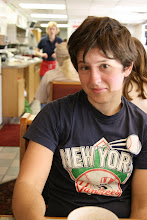 When my grandmother died all of a sudden I realized that she had once been a child like me. I was put in charge of picking out pictures from her childhood for a poster on display at her memorial service. What was amazing about this experience was that my grandmother was herself a prolific scrapbooker and had always taken a particular and somewhat peculiar delight in showing us her archive of things that happened to us not even so long ago. To some extent, scrapbooks of our own lifetimes seemed strange-- while they were meant to help us remember, they encouraged a performative crafting of the part of the scrapbooker (my grandmother) to divert and direct how that memory would be remembered. We remembered, but only within the narrative deemed acceptable by my Midwestern republican granny. And I only ever saw family pictures since my father's birth-- an omission on my grandmothers behalf that seemed to imply that my story did not include hers because we were not nuclearly related.
When my grandmother died all of a sudden I realized that she had once been a child like me. I was put in charge of picking out pictures from her childhood for a poster on display at her memorial service. What was amazing about this experience was that my grandmother was herself a prolific scrapbooker and had always taken a particular and somewhat peculiar delight in showing us her archive of things that happened to us not even so long ago. To some extent, scrapbooks of our own lifetimes seemed strange-- while they were meant to help us remember, they encouraged a performative crafting of the part of the scrapbooker (my grandmother) to divert and direct how that memory would be remembered. We remembered, but only within the narrative deemed acceptable by my Midwestern republican granny. And I only ever saw family pictures since my father's birth-- an omission on my grandmothers behalf that seemed to imply that my story did not include hers because we were not nuclearly related.My grandmother started scrapbooking after my father and uncle went to college when she and my grandfather began the onslaught of senior traveling adventures with other older couples like them. Her notes on these trips (aided by newer/faster/cheaper/simpler photo-taking) are exhaustive. When she started scrapbooking she simultaneously began a record of how things were playing out and how things were long ago. Maybe I'm not making it clear how interesting that is.... let's say she was 50 when she started scrapbooking. At the same time she was recording Age 50 and Onwards, she also began a scrapbook beginning with her wedding and my father's birth (Age 25 to 50). In both she worked in chronological order, but her vocabulary changed, a change that reflected her memory (for example, a memory-based caption of a photo would state "Easter, 1953" as opposed to a contemporary one, which would be more like "Easter, April 18, 1976, in the morning at home. The boys are at college." She also started scrapbooks that begin with her birth (Age 0 to 25) and other scrapbooks about her parents marriage (Age -3 to 0). She also made scrapbooks about my grandfathers childhood, a man she didn't meet until the first quarter of his life had already passed.
It gets even more interesting. Mimi, encouraged by the fixation my great aunt Jean (her sister-in-law) has with geneology, started investigating in her own family heritage and history by, surprise surprise, scrapbooking about it. But because she was scrapbooking about a time she wasn't alive for, and about people she may have not even met, or even have been directly related to, the approach of the narrative is less nostalgic and archival and rather, more sleuthy and analytical. Unlike with her scrapbooks from her own lifetime, the "scraps" of these older scrapbooks were not chosen to tell the story, the scraps were the story-- they were all my grandmother had. These scrapbooks are really interesting because she built them by simultaneously going backwards in time (the investigation) and forwards in chronology (the storytelling). How is that even possible? The obvious dilemma here seems to be, how does someone determine when their story begins and when it ends? Does the story of my life begin with my birth? Does it begin when my parents met? When my parents were born? When my grandparents met? And of course, when does my story end? With my death, with the death of my children? With their children? What if I don't have children?
I think this is why my project is so muddled right now, because like my grandmother attempted with her scrapbooks, I'm telling a story simultaneously forwards and backwards, a story about both family and strangers. I think this is turning into an exercise about how I understand the shape of time. Is it an infinite thread, an expanding balloon, a jumbled pile, a chapter book, an oceanic wave, or something else entirely? Perhaps time has a shape of its own-- it is shaped like time? The pictures of my grandmother as a child were lovely. I loved them. I made color photocopies of them and my father voiced concern that I would lose track of them in my collection of anonymous photographs. I pointed out to him that I had never even seen these photographs before, and my grandmother as a child was a stranger to me. But to some extent he was right too... now that I know that the person in these pictures is related to me it seems to make them different. She looks like me. The knowing changes what this means.

No comments:
Post a Comment